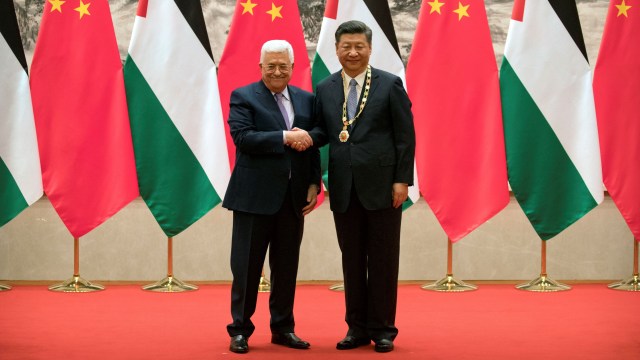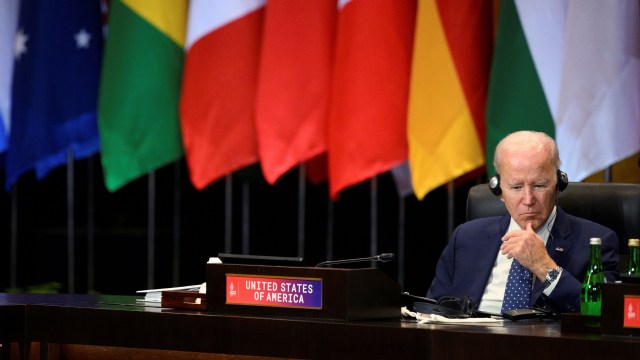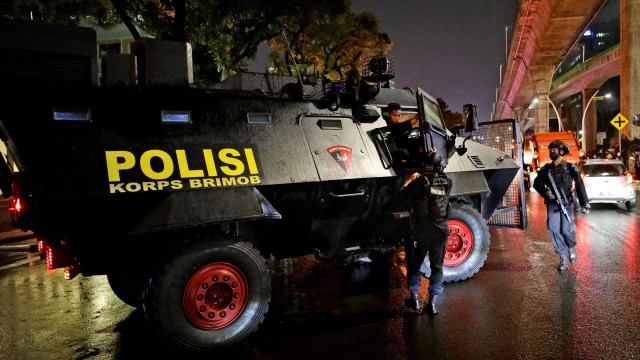Today at WPR, we’re covering China’s response to the Israel-Hamas war and the Global South’s role in transforming the global order.
But first, here’s our take on today’s top story.
Artificial Intelligence: U.S. President Joe Biden signed an executive order yesterday addressing concerns about AI, specifically its ability to facilitate the production of both weapons of mass destruction and “deep fakes.” The order came just ahead of the opening of an AI summit hosted by U.K. PM Rishi Sunak, which will include global leaders, tech executives, AI scientists and civil society groups. (Washington Post; New York Times)
Our Take: Biden’s executive order and Sunak’s summit are in many ways focused on two different issues. While the former is practical and immediate, attempting to tackle concerns related to what AI is already capable of doing, the latter is more speculative, focusing on getting a head start on preventing doomsday scenarios caused by what AI may be able to do in the far-off future.
Get the Daily Review sent straight to your inbox every weekday.
Different as they may be, though, both moves clearly reflect the widespread alarm AI has generated since the popularization in the past year of generative AI apps like ChatGPT and DALL·E, which can now convincingly mimic humans when it comes to writing, programming and the visual arts.
That alarm can become a chaotic muddle, though. So it’s helpful to subdivide it into three categories that correspond to specific challenges raised by AI and their political implications:
- Employment and jobs. There is grave—and understandable—concern that as AI tools are more widely used and become applicable to more tasks, they will take away jobs previously done by humans. But as columnist Paul Poast argued earlier this year, new technologies have taken jobs from humans for centuries. But they end up creating new jobs, and often in greater quantities than the ones they replace.
- Disinformation and bias. Not only do generative AI systems often render invented, false and incorrect information, they also have the ability to create hyper-realistic audio and video impersonations that can be used in disinformation campaigns—the deep fakes Biden’s executive order is targeting. Moreover, because AI models are trained on datasets produced by humans, they reproduce existing social inequalities, marginalization and prejudice. Here, regulation and reform are appropriate, but they must be balanced against the need to respect free speech rights.
- Security. AI will provide a significant military advantage for the states and groups that take a lead in its development. This explains Biden’s concern that it will be used by foreign countries or terrorist groups to develop weapons of mass destruction. But it also drives his restrictions on tech exports to China, which target the high-performing chips required for AI apps. Still, with much of the alarm over AI’s military applications amplified by Silicon Valley, some skepticism is in order, lest AI simply become a new lucrative market for the military-industrial complex, funneling even more money and wealth to Big Tech through contracts with the Pentagon.
Concerning as they may be, there is no guarantee that these scenarios will occur. Tools are already being developed and deployed to obstruct generative AI models’ ability to scrape copyrighted content and even to “poison” their databases, for instance.
AI systems are also incredibly resource-intensive, requiring considerable energy and water for powering and cooling the massive banks of servers that train and run them. In the end, it may not be policymakers’ decisions, but rather dwindling resources caused by the climate crisis that prevents an AI-driven doomsday scenario.


China Isn’t Ready for a Crisis Like the Israel-Hamas War
For the past several years, Chinese President Xi Jinping has fundamentally changed both the goals and the methods of Beijing’s foreign policy, with the Middle East central to China’s ambitions as a global powerbroker.
Given these impressive advances in increasing its relevance in the region, China’s response to the recent outbreak of severe violence between Israel and Hamas has been surprisingly underwhelming.
As columnist Mary Gallagher writes, there are deeper obstacles to Xi’s ambitions to translate China’s increased stature and capacity into actual power and influence, and the Israel-Hamas war in Gaza serves as a useful prism to understand them.
To Reform the Global Order, Listen to the Global South
There is growing recognition in the West that multilateral institutions need to change to deal with worsening crises, as well as to respond to the legitimate demands of marginalized countries to be included in international decision-making.

But there remains a lack of consensus—not only in the West, but also among Global South countries—on what a transformation of the global order entails when it comes to the nitty-gritty of crafting and enforcing international rules.
In today’s briefing, Aude Darnal clarifies what is at stake and deconstructs some of the most prevailing assumptions around this issue.

Question of the Day: Who won the Venezuelan opposition’s presidential primary election held Oct. 22?
Find the answer in the latest WPR Weekly Quiz, then read James Bosworth’s column on the recent election deal signed between the opposition and the Venezuelan government.

Nasrin Sotoudeh, a prominent Iranian human rights lawyer and activist, was arrested and later severely beaten, her husband said, after attending the funeral Sunday of Armita Geravand, a 16-year-old who died last week after being fatally injured in a reported confrontation with Iran’s morality police earlier this month.
Sotoudeh is renowned for representing women who refuse to wear a hijab in public, in defiance of Iran’s dress code. In 2019, she was sentenced to 38 years in prison for providing counsel to these women, a verdict that received widespread condemnation and made international headlines.
As Jasmin Ramsey wrote in 2021, though, Sotoudeh’s case fits into the Iranian government’s broader, decades-long assault on the country’s legal profession and the right to a fair trial—repression that is only getting worse.

For Iran’s Lawyers, Defending Dissidents Is Getting Dangerous
May 18, 2021 | As the violent repression of dissent has increased in Iran, so, too, has the jailing of lawyers and the erosion of their independence. Read more.
Indonesia’s counterterrorism unit, Densus 88, has arrested 59 Islamist militants suspected of plotting attacks to disrupt next year’s presidential and legislative elections.
Of those arrested, 19 were from Jemaah Islamiyah—a group that has been dormant for much of the past 15 years but is reportedly recruiting new members—while the other 40 were from Jamaah Ansharut Daulah, or JAD, which is affiliated with the Islamic State.
Both groups are notorious for plotting terrorist attacks across the country. And while the number of attacks has decreased in the past five years, both continue to have a nationwide presence. As a result, Michael Hart wrote in July, Indonesia continues to face an uphill task in keeping them at bay.
In Indonesia, Islamist Terrorism Is Still a Threat
July 13, 2023 | Two Islamist militant groups that have carried out terrorist attacks still maintain a nationwide presence in Indonesia. Read more.

A congressional council in Chile has approved the final draft of a new proposed constitution for the second time in just as many years. Read Frida Ghitis’ column on the new draft, which by making Chile more conservative would represent a major setback for the country’s young leftist president.
Venezuela’s highest court has suspended the results of the opposition presidential primary, which took place earlier this month, despite a recently signed election deal that allows each side to choose its own candidate. Read James Bosworth’s column on that deal.
More From WPR
- James Bosworth on Ecuador’s president-elect.
- Robert Looney on Lake Titicaca’s grave situation.
- Chris Ògúnmọ́dẹdé on reactions to the Israel-Hamas war in Africa.
- Paul Poast on Biden’s foreign policy.

